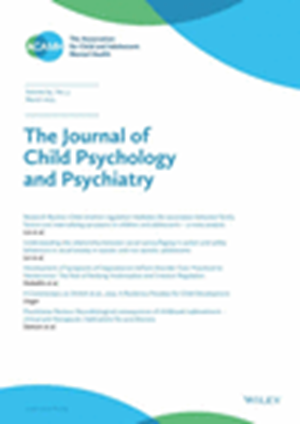自闭症和ADHD特征的亲子相似性与儿童3岁时的社会功能和心理健康。
IF 7
1区 医学
Q1 PSYCHIATRY
引用次数: 0
摘要
背景神经发育状况的研究迫切需要关注弹性或积极结果的预测因素,而不是核心症状和损伤。一个有希望的途径是考虑亲子相似性是否有助于保护家庭环境。例如,对相似-契合假说的研究表明,父母-孩子注意缺陷/多动障碍(ADHD)特征的相似性与父母或孩子对养育和亲子互动的更有利的评价有关。然而,很少有关于自闭症的相似度研究,迄今为止还没有研究亲子特征相似性是否能更广泛地预测亲子互动之外的儿童结果。我们在家族史队列中评估了亲子自闭症和ADHD特征相似性是否能预测儿童早期的社会功能和心理健康。方法我们的分析样本包括222名儿童(45.5%为女性)及其父母,他们来自一个纵向家族史(自闭症和/或ADHD)队列。在考虑了父母和儿童特征的主要影响后,计算了每对父母的自闭症和ADHD特征的一种新的亲子特征相似性度量,并使用稳健的层次回归来评估母子和父子自闭症和ADHD相似性是否预测儿童3岁时的社会功能和心理健康。结果母子自闭症特征相似度对儿童社会功能和心理健康有正向预测作用,母子ADHD特征相似度对儿童社会功能和心理健康无正向预测作用。此外,父子自闭症特征相似性正向预测儿童的社会功能,尽管在离群稳健回归中没有统计学显著性。结论亲子神经发育特征相似性可能对儿童早期社会功能和心理健康起到保护或促进作用。需要进一步的工作来确定在儿童后期是否有类似的影响,并调查相似-适合效应对儿童结果的潜在机制。本文章由计算机程序翻译,如有差异,请以英文原文为准。
Parent-child similarity on autism and ADHD traits and children's social functioning and psychological well-being at 3 years.
BACKGROUND
There is a pressing need for research on neurodevelopmental conditions to focus on predictors of resilient or positive outcomes, rather than core symptoms and impairment. One promising avenue is to consider whether child-parent similarity contributes to a protective family environment. For instance, investigations of the similarity-fit hypothesis have shown that parent-child attention-deficit/hyperactivity disorder (ADHD) trait similarity is associated with more favourable parent or child ratings of parenting and parent-child interaction. However, very little similarity-fit research has focused on autism, and none to date has investigated whether parent-child trait similarity is more broadly predictive of children's outcomes beyond parent-child interaction. We assessed whether parent-child autism and ADHD trait similarity predicted children's social functioning and psychological well-being in early childhood in a family history cohort.
METHODS
Our analytic sample comprised 222 children (45.5% female) and their parents from a longitudinal family history (autism and/or ADHD) cohort. A novel parent-child trait similarity measure was computed for autism and ADHD traits in each parent-child pair, and robust hierarchical regression was used to assess whether mother-child and father-child autism and ADHD similarity predicted children's social functioning and psychological well-being at age 3 years, after accounting for the main effects of parent and child traits.
RESULTS
Mother-child autism trait similarity positively predicted both social functioning and psychological well-being in children, while mother-child ADHD trait similarity positively predicted children's social functioning (but not well-being). Furthermore, father-child autism trait similarity positively predicted children's social functioning, though it fell just short of statistical significance in outlier-robust regression.
CONCLUSIONS
Our findings suggest that parent-child neurodevelopmental trait similarity may act as a protective or promotive factor for children's early social functioning and psychological well-being. Further work is warranted to determine whether there are similar effects in later childhood and to investigate the potential mechanisms underlying similarity-fit effects on children's outcomes.
求助全文
通过发布文献求助,成功后即可免费获取论文全文。
去求助
来源期刊
CiteScore
13.80
自引率
5.30%
发文量
169
审稿时长
1 months
期刊介绍:
The Journal of Child Psychology and Psychiatry (JCPP) is a highly regarded international publication that focuses on the fields of child and adolescent psychology and psychiatry. It is recognized for publishing top-tier, clinically relevant research across various disciplines related to these areas. JCPP has a broad global readership and covers a diverse range of topics, including:
Epidemiology: Studies on the prevalence and distribution of mental health issues in children and adolescents.
Diagnosis: Research on the identification and classification of childhood disorders.
Treatments: Psychotherapeutic and psychopharmacological interventions for child and adolescent mental health.
Behavior and Cognition: Studies on the behavioral and cognitive aspects of childhood disorders.
Neuroscience and Neurobiology: Research on the neural and biological underpinnings of child mental health.
Genetics: Genetic factors contributing to the development of childhood disorders.
JCPP serves as a platform for integrating empirical research, clinical studies, and high-quality reviews from diverse perspectives, theoretical viewpoints, and disciplines. This interdisciplinary approach is a key feature of the journal, as it fosters a comprehensive understanding of child and adolescent mental health.
The Journal of Child Psychology and Psychiatry is published 12 times a year and is affiliated with the Association for Child and Adolescent Mental Health (ACAMH), which supports the journal's mission to advance knowledge and practice in the field of child and adolescent mental health.

 求助内容:
求助内容: 应助结果提醒方式:
应助结果提醒方式:


